When the New York Times did an expose this week on corruption in Hawaii politics, we took notice on how much that has impacted Hawaii travel, specifically. Let’s just say the pineapple has been ripped to its core with juicy details. This NYT article referenced many players we already know from the Hawaii tourism industry. Then we looked further at the travel tie details. And sadly, it explains a lot, as you are about to see.
Many of you have left comments in the past asking why things seem in such disrepair including restrooms at Hawaii beaches, roads and highways, airports and their runways and other facilities. You’ve asked where the money goes from the taxes you pay as visitors and as residents, and now we have some answers.
A prominent Hawaii businessman, Milton Choy, was working with the federal government to help uncover the scandal. He wore a “wire “for a year to show that state officials took bribes from him. Here’s how the story unfolded in something that seems right out of Hawaii Five-0.


Hawaii’s elite have long partaken in clandestine, late-night political fundraisers.
They were often in an unspoken and unseen modest Honolulu location at 800 S. Beretania Street, pictured here. Later, the parties moved. With dining and unlimited alcohol, these get-togethers have long served as networking parties where Hawaii politics and business intersect, greatly impacting our beloved Hawaii travel sector.
At the parties, vast sums of money were placed in metal boxes.
Then, at the end of the party, politicians plus the host, who was a prior high-level employee of Hawaii Department of Transportation/Airports, would hand out the money to political campaigns based on pledges preceding the event. These parties are said to have become legendary, where lobbyists and executives met with politicians and obtained favors in Hawaii government contracting, very often related to tourism and infrastructure projects that are vital to Hawaii’s travel industry.
Is this in part why Hawaii tourism is in disrepair?
And, even after living many decades in Hawaii, this was hard for us to read. These parties were reportedly hosted by Wes Yonamine, then branch head at the Hawaii Department of Transportation/Airports.
Despite alleged efforts to curb such inappropriate, if not illegal dealings, the money has continued to flow, underscoring Hawaii’s political culture, which remains deeply entangled with private corporate interests.
The investigative report said that such gatherings are flourishing and result in a significant portion of the campaign funding throughout Hawaii. According to the report, these Yonamine parties have consistently attracted significant donations that boost the annual campaign revenues of some politicians. These affairs link corporate interests and Hawaii politicians in ways that likely impact the success or failure of Hawaii travel.
The impact on Hawaii airports for one, is significant.
These events may have significantly impacted Hawaii’s airports, a critical node in the state’s all-important travel infrastructure. The funding parties have preceded contract awards for airport expansions, repairs, renovations, and areas vital to maintaining and enhancing the Hawaii visitor experience, including operations and capacity. Timing of these generous campaign donations in relation to tourism contracts raises big questions about the integrity of Hawaii’s travel infrastructure contracting process.
Despite these glaring concerns, efforts over decades to reform the system have been met with resistance, as becomes obvious when seen in light of whose money is at stake. The Hawaii Legislature’s feeble attempts to close campaign loopholes that allow such donations have repeatedly failed, which now comes as no surprise.
The implications for the Hawaii travel industry are profound.
Common Cause Hawaii’s director said of the situation, “Pay-to-play” is woven into the DNA of the statehood of Hawaii and said that it has been this way since the overthrow of the Hawaiian Kingdom.
According to the article, analysis of the situation shows that over the past 18 years, people associated with government contractors have been responsible for giving tens of millions to Hawaii politicians. It is also noted that virtually all of the donations came via donors who didn’t mention the companies with which they are associated, thus helping obfuscate the relationships.
Some of the contractors mentioned include SSFM, whose president previously pleaded no contest to money laundering but subsequently contributed $130k to various politicians. We found that company lists among its projects, Honolulu airport taxiway engineering.
Others notable in Hawaii include Lt. Gov. Sylvia Luke, who oversaw the initial response to the Maui wildfires, who NYT reported received more than $107,000.
In 2021, contractor Goodfellow Bros., who we previously reported was involved in Maui Airport runway repairs, also won a $4.6 million Maui landfill deal. Following that project’s approval, NYT said that Goodfellow executives and family members gave campaign contributions of $34,000 to Maui’s mayor and council members, which made them among Maui’s most prominent political donors.
While it is legal for Hawaii legislators to maintain other jobs despite being paid over $70K annually by the state, it can result in obvious concerns. NYT pointed out that State Senate President Ron Kouchi, from Kauai, earns an additional $50-100K annually through employment with his brother’s company, which they pointed out is the sole trash services provider to agencies here on Kauai.
Another major Honolulu Airport contractor, NAN Inc., was mentioned. “Representative Micah Aiu is a lawyer at Nan Inc., one of the state’s biggest contractors, which won at least $39 million in projects last year. They have said they are not directly involved in their companies’ contracts.” We found that NAN Inc. won a nearly $150M Honolulu Airport contract for baggage handling systems that was performed last year.
Hawaii airports remain a focus of issues.
Many corporate guests of these political campaign parties performed work at Hawaii airports, which resulted in deals worth more than $130M. NYT noted, “At least 59 companies competed for airport contracts between 2014 and 2020. But nearly half the airports’ 153 professional services contracts went to just 14 companies.”
Hawaii’s airports are gateways pivotal to the success of our tourism-dependent economy, yet continue to be far less than world-class, while also being lucrative hotspots for political and corporate maneuvering.
This sad state of affairs in Hawaii travel also sheds light on broader implications of political funding in Hawaii, calling for a reassessment of these practices regarding transparency, and the health of Hawaii travel and more.
We welcome your input!
Get Breaking Hawaii Travel News
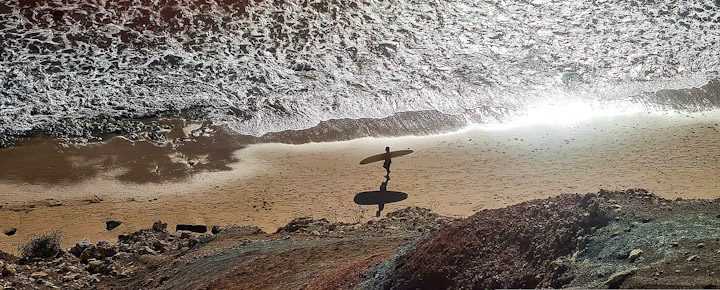
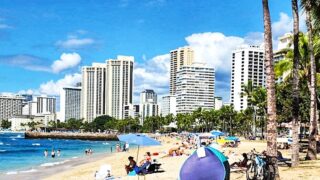
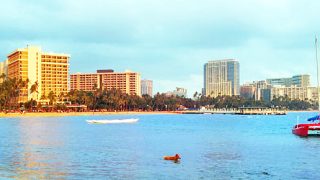
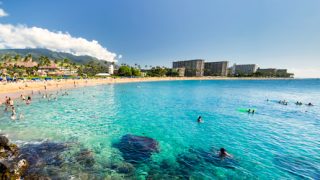

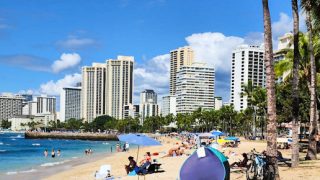
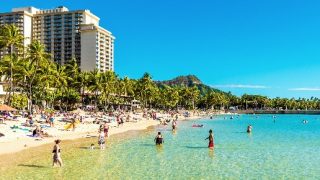
Sad to say the least. I often wonder why our airports are so filthy and in disrepair. The bathrooms are scary. The walkways filthy. Luggage can take 30 minutes to come down the Shute. Clorox and some elbow grease with a good plumber would go a long way.
Thank you, Beat of Hawaii. Corruption in Hawaii has been going on for a very long time. And it takes out-of-state publications like the New York Times to help bring the enormity of the problem to light. Checkout the investigations into the Hawaii Visitors Bureau and Bishop Estate.
Where has all of the money paid by taxes into the affordable housing program gone? Where have all of the donations made to the Hawaiian Community Foundation for fire victims gone?
Imagine That! Corruption. I don’t remember hearing of anyone representing the Hotel and Resorts, that must be other parties and private dining in the finest establishments. A dimly lit corner table where a hand off of cash can be accomplished clandestinly. Of course the dinner is part of the bribe too. Wise up, more than likely you voted for at least some of them. Maybe the owners of STR’S should have attended the bribe parties, they wouldn’t be having the problems they now face. I’ve heard that the Southern Hemisphere is enjoying the influx of Vacationers and their money 💰.
There are no words to describe how appreciative we are to see someone put the government corruption regarding the tourism department into print. When Gov Green was approached with the exposed tourism scam, requesting that they shut down the tourism department, he instead gave everyone a raise. Hopefully we get an honest government representative some day that doesn’t want to line his and his friends pockets.
I wonder if they will get bonuses too? Now what does that tell you about Governor Green?
I’m deeply disappointed to learn about the allegations of corruption involving SSFM International, a major contractor on Maui and throughout Hawaii. It’s concerning to see that a company involved in important transportation projects, including bike/Ped pathways, has been linked to unethical behavior.
Moving forward, it’s crucial for both the county and the state to carefully consider whether to continue hiring SSFM International for future projects. We need to hold contractors to the highest ethical standards and ensure transparency in all dealings with public funds.
The only way to break the habit is to elect forward thinking candidates to the legislature instead of the same old same old. We have an opportunity this fall but big money drowns out our voices. Vote for honesty and innovation.
Milton Choy helped the Federal Government with their investigation, with what was uncovered should have put many in prison for decades. Instead, Milton Choy was able to help convict a handful of people, including a former State Senator, who are serving very light sentences. For Mr. Choy’s cooperation, he received a reduced sentence of 41 months in prison, the longest sentence of any of those arrested and convicted. In many cases nothing has changed and it is ‘Business as Usual”. Any wonder why nothing seems to change in the State of Hawaii!!! The investigation by Federal Authorities yielded a few bits of “Low Hanging Fruit” and nothing more. What would another investigation find? There’s plenty of low hanging fruit in Hawaii.
I wonder if Barack and Michelle Obama have involvements in this?
Given they are politicians and have residency in Hawaii.
Just greed everywhere, “imagine all the people sharing all the world”…me me me.
I am so sorry to read this article. I love Hawaii and the people there. I only get to visit every few years and usually visit Kauai. That is like heaven on earth. I feel so bad for the people who do live there and find out about corruption. The people I have met are great, laid back people with such good hearts that you expect everyone is like that. I guess some people get lost in the power. My heart is breaking for Hawaii. Also as a side note I enjoy your articles. Keep up the great work.
This Article which sites information coming from the NYT is probably just scratching the outside layers of these Taxpayer betrayals. I doubt that anyone will get much deeper, this has been going on for a long time. While Taxpayer Money 💰 is being rewarded via the ‘old boy’ system, should anyone ever doubt why Hawaii is falling apart? It sounds like the Justice Department could use the RICO Statute for decades, not everyone will keep quiet during questioning. The reason behind fleecing taxpayers and Vacationers alike has been uncovered, lock em up Danno!
Yes! We hope they get fired at the very least. We need a representatives here. I am praying for candidates to step up. The timing is right! Thank you for the support. We need all we can get!
This article only points to who got contracts not why work not get done, or done poorly.
Only scratching the surface. I hope they keep digging so they can get these guys out.
I wonder if this has anything to do with the state pension being broke? I read in 2018 it was
12 billion in debt.
I wondered how in the world a state with 1.5 million people, a flourishing tourism income could wind up in this position.
All of our tax money (outer islands) goes to Oahu. This explains how Maui had pot holes in the roads for decades when we pay such high taxes. The money trickles if at all back to the islands that contributed the tax money. Hawaii residents must speak up now. We need new government ASAP.
Thanks for the opportunity to comment on this sad state of affairs.
The residents of Hawaii should be outraged that their public officials are on the take from the contractors who are being paid with their tax dollars. Hope the voters will “throw the bums out” at the earliest opportunity.
Skip S, unfortunately tossing them all out, even if they are all locked away in prison, won’t work. The voters have an ongoing problem, voting more criminals in to office. They don’t recognize that the problem isn’t just with those in office currently, it’s been different names and faces perpetrating the same crimes year after year.
Ernie, that does not sound hopeful. I doubt that we are deliberately voting in criminals to abuse our rights and take our money. We need the dirty deeds exposed for change. I was not aware. I thought it truly is the high cost of living here, construction; everything including food and supplies having to be shipped in etc.. There should be checks and balances on a federal level. If we make enough noise perhaps we can get some help.
Hi Kim L, it’s Ernie S. It seems like a dreadful situation because it is. Can this be turned around easily, no, but it can be. Removing the current politicians at every level of government is what is called for, will the majority have the stomach to do that? The Federal Government might eventually step in if there is enough Evidence of crimes. The RICO Statute seems like a good way to Prosecute these people. There’s always Hope if enough people of like mind take this on. If not, keep up getting the Real Information out to everyone. Politicians know that if they keep saying the same things often enough, people will believe the lies. Use the Truth repeatedly to counter them. Best of luck, enough of Bad Governance already!
We are outraged and spreading the news. Coconut wireless- let’s throw the bums out! Please stand up for our rights. Take the blinders off.
This type of corruption sounds more like 1920s Chicago corruption without the murders. Pretty sad. What ever happened to sense of community and the “Aloha Spirit”? Common Hawaii… you are better than this and these people should be banned from future contracts.
We do have Aloha Spirit! Just not on the government level. We need your support, prayers, ideas and for you to spread the news so we can get help. We need and appreciate our visitors. We are unfortunately dependent on tourism here on Maui more than any other island. There is not any commerce not affected by tourism. It is the government for whatever reason making visitors feel unwelcome. This trickles down to the locals that have drunk their KoolAid.. Not for long. Exposing the truth is spreading here. Thank you BOH!
Overwhelmingly, the majority of Hawaiians have voted for one specific political party. What we see here is what that political party does. It is happening in other states that have voted this way also.
Hawaii not only drank the Kool aid, a lot of other states have also. And American is in a big mess in so many ways.
I hope these Hawaiin officials who partook in this corruption are locked up and every other politician who does this.
Sadly, this is nothing new.
Unfortunately many people, including foreigners, believe that Maui is closed for business so to speak. The Hawaiian Politicians caused that lie and it keeps going to the irk and dismay of the residents and businesses. There’s always the possibility that Jealousy and Greed are responsible, what are the chances? An after the fire sale of shuttered businesses and properties that go for cheap, only to be resurrected not too long afterwards. That’s one heck of a way to make a fortune, off of the losses of others, sounds like something that a slick politician might want to do. Purchase and then announce to the world that Maui is open for business. Terrible thought, I know.
It’s exactly what I’ve been thinking since the fire. The government is causing distractions for a specific outcome. They laud the ground work prior to the fire regarding eminent domain with a declared disaster. Drive values down and someone will be buying it up. So sad. I don’t know what else to do but be a squeaky wheel and call attention to what is going on. Thank you for speaking up🙏
As we said before… follow the money. It’s time people get their head out of the sand. Ironically, it took a publication on the East coast to try to shed light on the dark side of ‘paradise’.
I have never saw so much government corruption. Is it entitlement? Airports should be run by a commission not the State. Only qualified people should be on this commission. Kona should have 2 runways. Maintenance/Repairs need to be done before any emergency shut downs.
Have a plan- if a plane can’t land in Kona or Hilo- land in Hilo or Kona and bus people. It doesn’t do any good to take people to Honolulu if there destination is Hawaii Island!
Agreed! We need federal assistance, not that there isn’t corruption everywhere. There has to be a commission that oversees each state. This affects all Americans because they continue to visit our islands. We all need our rights protected. We have all seen the craziness in our own White House but we can not just lay down or keep our heads in the sand. Share the news on your social media. Please. We need your help.
Was anyone familiar with Hawaii shocked by this? I doubt it. After 50+ years of long trips to Hawaii it was evident that the fix was in. Always wondered where all the tax money went since it was evident it wasn’t being spent to improve life for residents or visitors. The tourists agency headed by a hotel mogul needs to be really investigated. Why are vacation rentals of a month or more being targeted? So hotels make more money. Sad to say the entire state needs to be investigated by the DOJ for corruption.
Oh the DOJ is way too busy going after the other party to ensure their side stays in power. No time for real investigation and real prosecution.
And it being seen the majority of the citizens voted this way.
Not only are the presidential elections, but local elections. Since 1957 6 out of 8 Governers elected were one party.
You get what you vote for. I feel bad for the people who did not vote this way, but have to suffer the outcome.
This is what is happening in the state I live in.
Presidental Elections since 1957
Number of elections 16
Voted Democratic 14
Voted Republican 2
Voted other 0
Voted for winning candidate 10
Voted for losing candidate 6
I so wish this could all disappear
It hurts so for we the native hawaiian peoples have been
Bashed, trashed, smashed, then just about shrunken to the smallest represented populous & we are the true original owners.
May akua hear our pleas
For ownership back into
We the native hawaiians
Thanks for posting. I always learn something when I hear from Native Hawaiians.
I thought the Native Hawaiians get free land and pay no taxes. Is this not the case? What injustices are currently being perpetrated against the Hawaiian people? Not referring to past ancestors, but Hawaiians who are alive today, and the conditions present today. Serious question, please educate me.
Not only do native Hawaiians not get free land and housing but the state is holding on to what belongs to them. They pay the same high prices and taxes. They children are priced out of living on their home islands and leave island for educations, jobs and the opportunity to own an affordable home. They are on long lists waiting to be given pieces of land that has belonged to them since the Queen gave it to the state on behalf of her people. Many blame tourism because the government distracts them rather than taking any blame or making positive change. Education and facts go a long way which why I am so grateful for this corruption coming to light.
The Queen left 1000s of acres in the states care for the people. They still have it. It is not the small pieces of land that mainland people have bought & made their homes. Look at the map. Look out the windows of the plane when flying overhead. The state has that land & especially with the fires should have started building & given that to the people. It will never go back to being only native Hawaiians. Commerce is needed for the economy. Complaints & prayers are to the wrong entities. Why the heck has the state held on to this land meant for the people for so many decades? Tell your ohana & friends to rethink their support of the current government. The attacks on STR owners and tourism is ridiculous and misdirected. Seek facts.
Hi Kim, the withholding of the “Queens” land is a disgrace, many more families could have had their home by now. The hold up isn’t caused by the State, Federal, or even the Local government. Those who have been charged with the land dispersal are Native Hawaiians. According to them they must perform a lineage on every applicant to be certain that they qualify. With all of the applications and the free time awaiting placement there shouldn’t be too many left to check. I wonder what the holdup is, why aren’t there plenty of lots waiting to be built upon. The slower they go the more I begin to think that maybe, just possibly, the holdup is something less apparent. I hope not.
Thank you, Kim. The Native Hawaiians should be given the land they are legally entitled to, for sure.
My question, though, refers to what Momi said about the Native Hawaiians being “bashed, smashed, and trashed”.
Everybody who grew up in Hawaii and isn’t earning a decent wage is having to leave the islands. The same is happening in every other state as well. Long-time residents who grew up in their neighborhoods are having to move away. This is all very wrong, but it is not particular to Hawaii, nor is it particular to Hawaiians.
There must be something Hawaiians can do to claim their land, though. Is the problem that they don’t have the documentation to prove they are Hawaiian, or is there some other reason?
The issue has been going on for a very long time. If the state had given the land to the Hawaiian people when they should have it would be passed on to the next generations. We would not have the issue now. Now very few have even half Hawaiian blood in them. I think they now have to be 1/4 Hawaiian and that should easily be able to be proved. Those Hawaiians that I have talked to tell me that they have been on the “list” as have their parents for a long time. They have reason to be angry and I know this is not isolated to Hawaii but it explains how the government uses the feelings of people and directs this towards tourism. We clearly need tourism for our survival. We can’t go back to the days of living off the fish we catch.
Hi PatG, even if everyone brought all of the documentation the Board of Hawaiians still must research everything to be completely certain that they meet the qualifications. They move at a snails pace, or slower. They need to hire help in my opinion. On the rest of your posting, you are correct. Because of rising housing and living expenses people are moving, often it is the grown children moving for work and the ability to find more reasonable housing. Good Point.
A Representative should not have a second job where there’s a clear conflict of interest!
NYT just broke the story? I’ve not seen it on the news. Are arrests coming?
Our airport in Kona is embarrassing! No parking, no lobby, no air conditioning and you exit and board your plane out on the runway via movable stair setups.
Everything, like hotels, being so expensive isn’t helping.
So that is where all our tax money has been going!
Correct. We need to spread this news with ohana and friends. Until we get together on the same page there will not be positive change. We need to get these politicians out. ASAP! I am telling everyone. I share this on social media asking others to share it on theirs. Stand up, don’t back down. Taxes are too high and being stolen. We need to get this under control to attract professionals to our island, new commerce so that we are not so dependent on the only one we have now which is tourism. Thank you for speaking up John. Now lets shout!
Where does one begin? For me and my late husband, 1995 Big Island.
Didn’t Take long to observe the rampant nepotism.
This state is a good example to not judge a book by its cover.
This is state is stunningly beautiful; especially when viewing away from the populace areas.
The view is deceptive. Greed
(“Love” of money) breeds quickly and generational.
Unfortunately, this sin is pervasive with no indication of disappearing, in the state of Hawai’i.
Generations of people rubber-stamp when voting, so nothing changes.
The Good News is, they really aren’t in charge, as it seems.
SomeOne else is, and will, soon clean house, so to speak.
Love to all who Love,
Sharon
🌺 🌺 🌺
Thank you for speaking up Sharon.od appreciate if it didn’t sound like all of us are to blame. I wouldn’t doubt if there wasn’t some corruption in the counting of the ballots here. We know we need change. How do we get it? Who do we turn to? We ask for your support because it is obvious that we cannot do it alone. We are a US state. The US goes to the aid of foreign countries before one of its own states? Come on. We don’t have the answers. Please help us. We appreciate your support. We humble ourselves admitting that we do need you. Please do not judge us or withhold your support because of what our government is doing and saying. The Aloha will never die.
It’s always seemed obvious to us in the over 20 years we’ve come to Hawaii that there’s something up between the hotels and the government. Those big, broad sidewalks in Wailea, juxtaposed against ratty, terrible, dangerous roads in Kihei… The blocking of beaches near hotels to the general public. The way the Hilton suddenly has gated property near the shore in Kihei. The hotel at Black Rock, an important cultural iconic landmark. And now the desire to keep the hotels and their high prices functioning at all costs…
Interesting article and very disappointing. Government. Green is pushing to get rid of short term rentals which many visitors use in order to save money. He wants to decrease mainland travel while pushing the Asian market. What benefits were obtained with the recent announcement of a 17 million purchase of property on Hawaii that is owned by a Japanese entity?
It’ll be a “Cold Day in ….” before anyone answers for this IMO…
Best Regards…